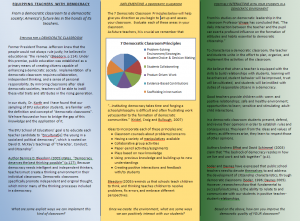Kathryn Davis and Dr. Byran Korth, Early Childhood Education
The purpose of this project was to research and compile recommendations for developing positive teacher-student relationships in order to better prepare prospective teachers to establish a democratic classroom. We have addressed this challenge through researching and compiling positive teacher-student relationship recommendations, along with seven specific democratic classroom principles.
As I worked under the direction of Dr. Byran Korth in carrying out this research project, we conducted a thorough literature review regarding characteristics of positive teacher-student relations and democratic principles. We designed interview questions and protocol, interviewed current prospective teachers, and compiled and interpreted our findings.
As we started our research, I expected we would interview multiple groups of people (parents, teachers, and prospective teachers), but after narrowing our goals, the focus became prospective teachers and their implementation of democracy. Interviewing the different groups of people listed previously would be an area that could be further developed and add merit to this research.
As we reviewed our interview results, we noted there was a gap in students repeating the definition of democratic classrooms and being able to describe principles that create that kind of environment; so we turned our focus toward constructing specific democratic principles that would help mend this gap. We began to compile our findings of principles of democracy in such a way that would help potential teachers assess their knowledge and application of democracy in the classroom.
It was anticipated that we would compile our findings and recommendations into a user-friendly pamphlet that would be easily accessible for prospective teachers to review and research further as they self-evaluate. We prepared these recommendations, expecting they provide teachers with the required building blocks to create safe environments with nurturing relationships needed to not only foster academic learning, but also the development of a democratic classroom as they enter the schools.
The pamphlet will be disseminated at Brigham Young University School of Education.
References
- Bleedorn, B. D. (2005). Education is everybody’s business: A wake-up call to advocates of educational change. The United States of America: Rowman and Littlefield Education.
- Daynes, G. (2005). Enculturating the young in a social and political democracy: neighborhoods and networks. Paper delivered for Freshman Academy at Brigham Young University.
- Effrat, A. & Schimmel, D. (2003). Walking the democratic talk: Introduction to a special issue on collaborative rule-making as preparation for democratic citizenship [Electronic Version]. American Secondary Education, 31, 3-12.
- Kridel, Craig & Bullough, Robert,V. Jr. (2007) Stories of the Eight-Year Study: Reexamining Secondary Education in America. Albany, New York: State University of New York Press.
- Soder, Roger. (1996). Democracy, Education, and the Schools. San Francisco, CA: Jossey-Bass.
- Wraga, W. G. (1998 August). Democratic leadership in the classroom: theory into practice. Paper presented at the Czech National Civic Education Conference, Olomouc, Czech Republic.

